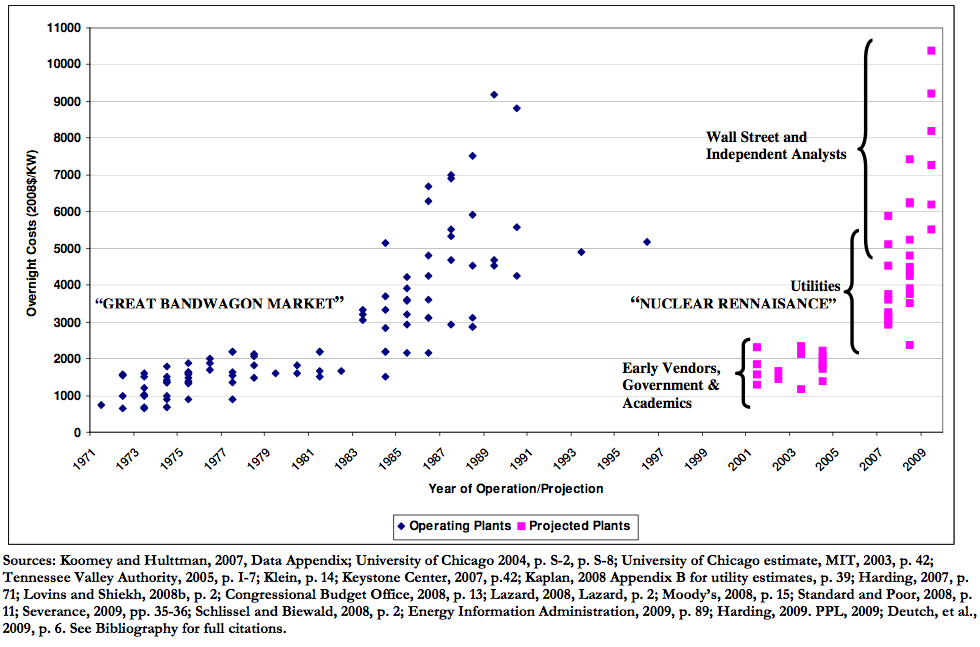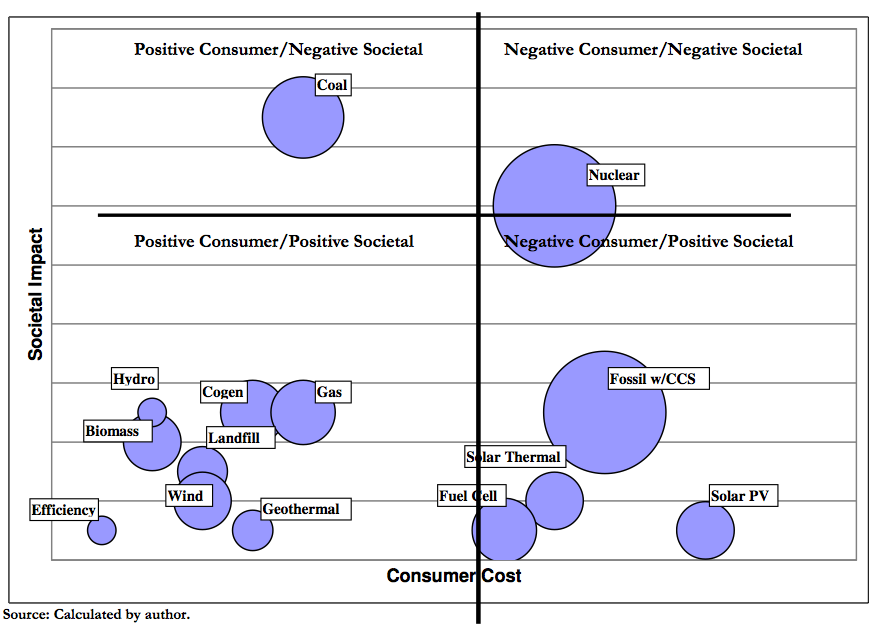It is amazing how many nukies come on this board pretending to be "open minded" about all energy sources; they initially embrace renewables but always do it in the context of the false construct of "renewables can't do it alone so we need nuclear too".
In fact (as has been shown here on EE time after time after time) the actual position they are trying to promote is "WE NEED NUCLEAR". It always becomes obvious soon after these nuclear envirnmentalists begin posting on energy that the lip service they give to renewable energy is nothing more than greenwashing for their actual agenda - the attempt to persuade people that nuclear *must* be used.
Take this case in point. I posted above that both past performance AND current analysis based on expected market conditions predict that new merchant nuclear power plants have a very high chance defaulting on payback of their capital investment. The historic record shows a terrible pattern of default and a Congressional Budget Office forecast in 2003 that there was a better than 50% chance of default based on prices that were 1/6 - 1/4 the prices that exist in 2010.
What was the response? Maybe this will remind you. It was as if the CBO and Citigroup analysis I'd included didn't exist:
And as we all know, what happened in the past is 100% guaranteed to happen again.
That sounds familiar. Oh yeah, I heard it on BSG.
The main reason for cancellations and closures of nuclear power plants were the constantly shifting legislation and regulations along with countless lawsuits (nuisance and frivolous included) that pushed the timelines so far out in the future that the backers either decided to cut their losses or simply ran out of money.
Those conditions do not exist today so you cannot simply extrapolate from past conditions when times have changed. Sorry, the nuclear power industry is not dead. Booga-de-booga! Scares ya, don't it...
So the assertion is that we cannot look to the past to predict future performance.
To an extent that is true; the past is only one area of information we need to examine when we try to understand our path forward. In the case of nuclear plants what it tells us (see graphs) is that claims made based on uncritical acceptance of the data provided by the nuclear industry
consistently underestimate the costs of nuclear power in all areas.


Is that a surprise or controversial to any rational, open-minded person that an industry would try to promote a picture of themselves that favors their economic well being? Of course it isn't. But we get absolutely bizarre responses from the nuclear environmentalists that are unfounded in fact or reason; their only purpose of such bizarre replies seems to be to insulate the nuclear industry from any criticism at all by any means necessary.
Another favorite meme of the nuclear environmentalist is that "if you oppose nuclear power, then you are a
de facto promoter of coal and fossil fuels". Let's look at how the supporting logic for that claim is laid out:
Look at history and you will clearly see that for every nuclear power plant that was stopped (by whatever means), another one or two coal power plants have been built. The demand for electricity has never stopped going up. The utility companies know that if they do not supply enough power to exactly match demand there will be disastrous results like brown outs and black outs. That is the nature of electricity. It isn't a series of tubes.
The energy users in America, residential, corporate and industrial, are not going to wait 30 years for the amount of renewables we need to be built. A total switch of our energy sources is going to take decades. We need to have as much solar power as we can get, it does not matter if that is on your roof or a huge field of solar panels or solar thermal power. We also need as much wind energy production as we can possibly implement as well. The same goes for geothermal power plants, wave and tidal power and biofuels. Even landfill gas should be tapped as a source of energy. As a side note, it makes me sick to my stomach to see the landfill in my area burning off the methane produced by the landfill. They are in the process now of installing a generator there and I can't wait till it comes online.
But to deny that nuclear power has a very important role to play in helping America to finally end our addiction to fossil fuels is pure insanity.
To answer the question of which environmental groups supports nuclear power, look at the former leader of Greenpeace. He has come to realize that the coal industry is the main beneficiary of Greenpeace's opposition to nuclear power.
Look at the fiasco of the California Air Resource Board decision to end the electric car mandate for California (which effectively killed off the electric car, or at least helped). I see the same effect happening in the environmental groups.
This poster is well aware of the FACT that it takes much, much, much longer to bring nuclear power online than it does to bring renewable energy online. Nuclear power is also far more expensive than the renewable/energy efficiency alternative. So, any money that is spent on nuclear is, IN FACT, slowing the transition away from carbon based fuels.
However, that knowledge doesn't stop our nuclear environmentalist, no. That mindset sees PROOF in their cherry picked slice of the historical record here, whereas before such a slice (and it was in the proper context) was rejected as being only worthy of derision. Yes, instead of the earlier ridicule, we now have,
"Look at history and you will clearly see that for every nuclear power plant that was stopped (by whatever means), another one or two coal power plants have been built" That is true, but when we think about how it comes on the heels of the first statement criticizing the use of history as a means of determining future performance it really is more informative at a deeper level related to the perspective of the nuclear environmentalist. We can at least find some consistency in the position however, when we note that in both cases contextual analysis is ignored in order to promote a
false position that is favorable to the nuclear industry's efforts to improve public opinion of their product.
A comprehensive analysis of renewable energy resources and technologies was accomplished by the UN for the 1992 Rio Earth Summit. This analysis demonstrated that we could, in fact, operate a modern culture on renewable energy sources alone with existing and very near term technologies. Those "near term" technologies are now being deployed at an incredible rate. There is no dispute in any academic literature focused on design of energy and environmental systems about the ability of renewable energy to deliver what we need. It is a settled issue and has been for nearly 20 years.
The nuclear environmentalist would have you believe that coal interests are opposed to nuclear power - and a few of them are. However, a comparison of the range of economic stakeholders for coal is almost identical to the range of economic stakeholders for coal. Again, this is a demonstrable fact. The minerals mining industries, huge project developers like Halliburton and Bechtel, the utilities, boilermakers, even the grid operators are all financially dependent on the existing centralized energy system and they have opposed the deployment of renewable energy since it started being an issue in he 70s.
They know that the type of distributed grid that supports renewable energy will reduce their role in supplying power to a role that is better described as peripheral rather than central. We will need them to move wind energy and large scale solar around but that will ultimately be less than perhaps 40% of the electricity consumed. In other words, if push comes to shove, consumers will be able to get along without them.
The new big players will be companies like Sharp or BYD, large electronic manufacturers that will make money selling devices at the costs of manufacturing instead of charging for the energy itself.
So it is pretty clear where the economic interests supporting nuclear power are. It is also clear that the misinformation being distributed by nuclear environmentalists is designed to tackle the biggest obstacle faced by the nuclear industry - lack of public support.
Detailed analysis of public beliefs and values tells us that concern for climate change DOES NOT predict whether a person supports nuclear power. What DOES predict whether they support nuclear power is if they trust the nuclear industry. The broader research further tells us that such trust in the nuclear industry is a result of the same values that predict support for coal and petroleum. Again, this is information that is well known on this board, but still the nuclear environmentalists try to portray support for renewables as indicating secret support for coal.
And finally one last point. Note the use of Patrick Moore as greenwashing for the nuclear environmentalist. That is in spite of the FACT that Moore is paid by the nuclear industry specifically to perform that function. He is paid to go around the world and support nuclear energy, trading on his early involvement in Greenpeace. That is his sole function - to be a recognizable "green voice" that supports the nuclear industry. He doesn't work to make nuclear power better, he is simply a paid shill.
As do all other major environmental organizations that I am aware of Greenpeace itself totally rejects nuclear power as a viable path to a noncarbon, clean and sustainable energy system.